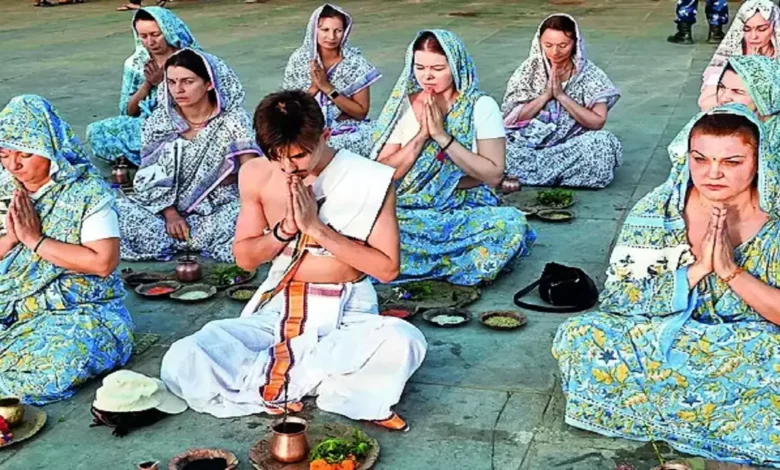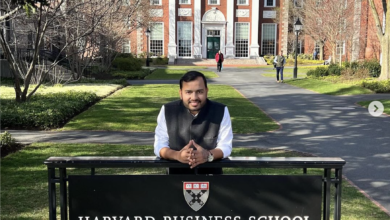Amid ‘pitru paksha’, twelve Germans offer “pinddaan” in Gaya, Bihar
According to Gaur, "The number of foreigners visiting Gaya during Pitru Paksha is increasing every year.”

12 German citizens—11 women—offered “pinddaan” at Dev Ghat on the banks of the Falgu River in Bihar’s Gaya District in hopes of bringing the souls of their ancestors to salvation.
The pinddaan rituals and “jal tarpan” at the Vishnupad temple and “Dev Ghat” were carried out by all the women while wearing traditional Indian apparel (saree and blouse) for the salvation of their ancestors’ souls. The group’s lone male participant donned a dhoti to perform pinddaan.
They engaged in pinddaan in front of the local preacher Loknath Gaur.
The German nationals included Kevin (a male), Natalia, Svetlana, Oxana, Shasa, Irrina, Margherita, Grichkevich, and others.
Every year, the Vishnupad temple in Gaya hosts the Pitru Paksha Mela, a Hindu rite in which people pray for the spirits of their ancestors. For the privilege to participate in the pinddaan ceremonies, many Hindus from all over the world visit the temple during Pitru Paksha each year.
When performed during Pitru Paksha, which began on September 29, in Gaya, pitra puja and pinddaan are regarded as extremely fortunate rituals.
Elisentra told the media shortly after completing pinddaan, “This is my first visit to Gaya and I feel relieved after performing the ritual. It’s a great place and people are very cooperative. We will never forget this moment throughout our lives”.
According to Gaur, “The number of foreigners visiting Gaya during Pitru Paksha is increasing every year. Recently, a woman from Ukraine had offered a mass ‘pinddaan’ here for peace and salvation of the souls of soldiers and people who died since the Russia-Ukraine war began in February 2022.” as reported by the Hindustan Times.
Significance of Pinddaan in Bodh Gaya, Bihar
The Shraddha fortnight is thought to be the time when people who depart from their bodies, regardless of location or form, return to earth and find satisfaction in Shraddha and Tarapanam.
Pind-Daan is a simple and easy way to salvation, according to Hindu beliefs. In various locations across the nation, Pind-Daan is carried out, but Gaya, which is located on the Bihar side of the Falgu River, lays a great deal of importance on Pind-Daan.
According to legend, Lord Rama and goddess Sita also offered Pind Daan in Gaya for the salvation of King Dasharatha’s soul.
According to the Valmiki’s Ramayana, Rama and Sita travelled to Gaya for Pind-daan during Pitru Paksha after King Dasharatha passed away while Rama and Sita were in exile.
Sita ji waited for Rama and Lakshman to return to the Gaya Dham side of the Phalgu River while they were out collecting materials for Pind-daan in the town.
King Dasaratha’s spirit implored for Pind-daan as the period for it was about to expire. Sita Ji created a pind of sand for the late King Dasaratha and performed Pinddaan after observing the passage of time and taking the vat tree, Ketaki flowers, and cow as witnesses on the banks of the river Phalgu. A person who bathes in the Phalgu Tirtha and sees Lord Gadadhar (Lord Vishnu) in Shraddhapaksha is said to be released from the debt owed to one’s ancestors according to the Mahabharata.
The three primary rites in the Phalgu Shraddha are: Pinddaan, Tarpanam, and Brahmin bhoj. In Pitru-paksha, there are multiple rites and sacred laws. Devotees carry out rituals for one day, three days, seven days, fifteen days, and seventeen days.
Gaya is referred to as the city of Vishnu. It’s referred to as the Land of Salvation. It is referenced in both, the Vishnu Purana and the Vayu Purana.
You might also be interested in – 4 dead and 100 injured as North East Express derails in Bihar



